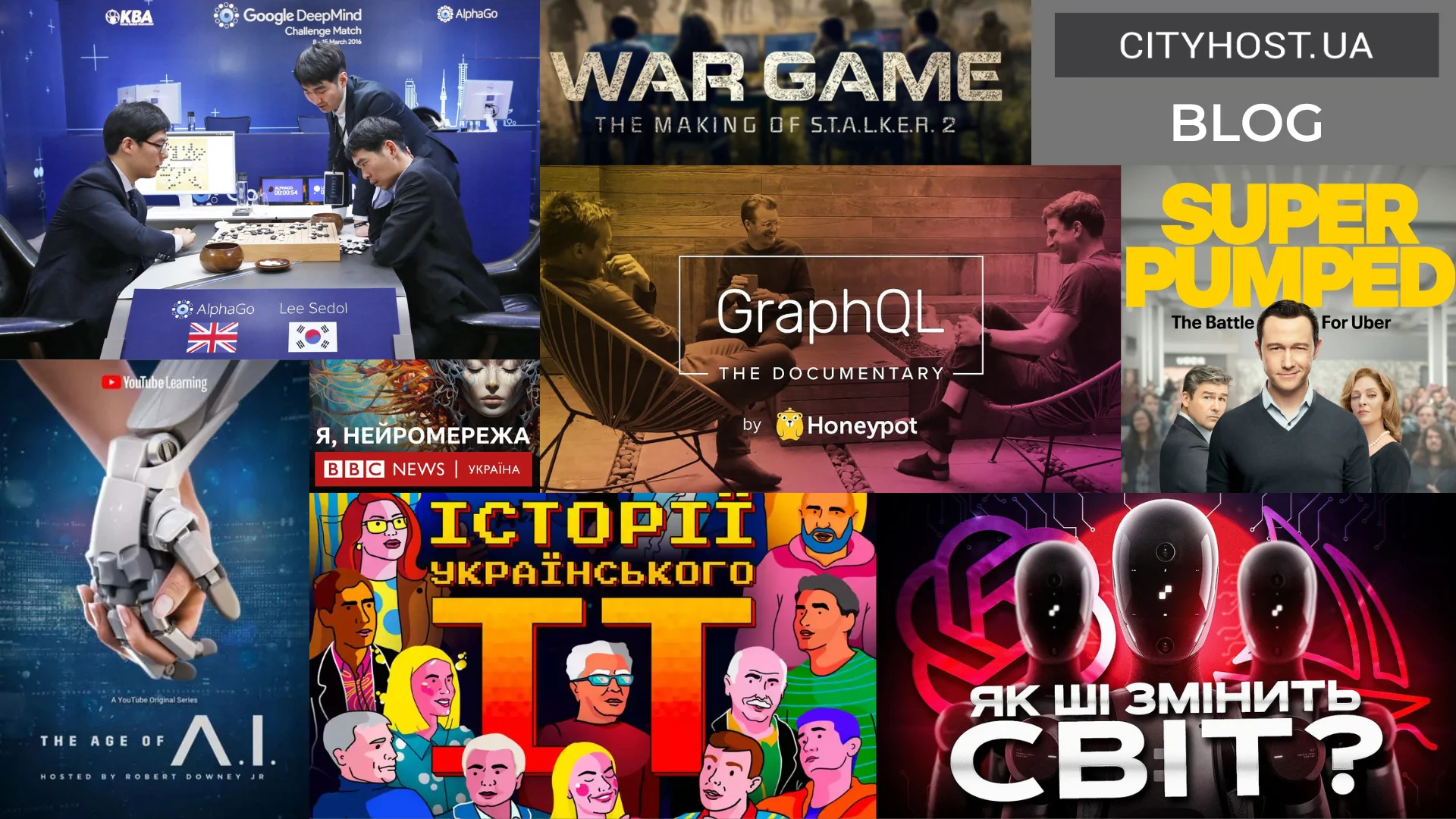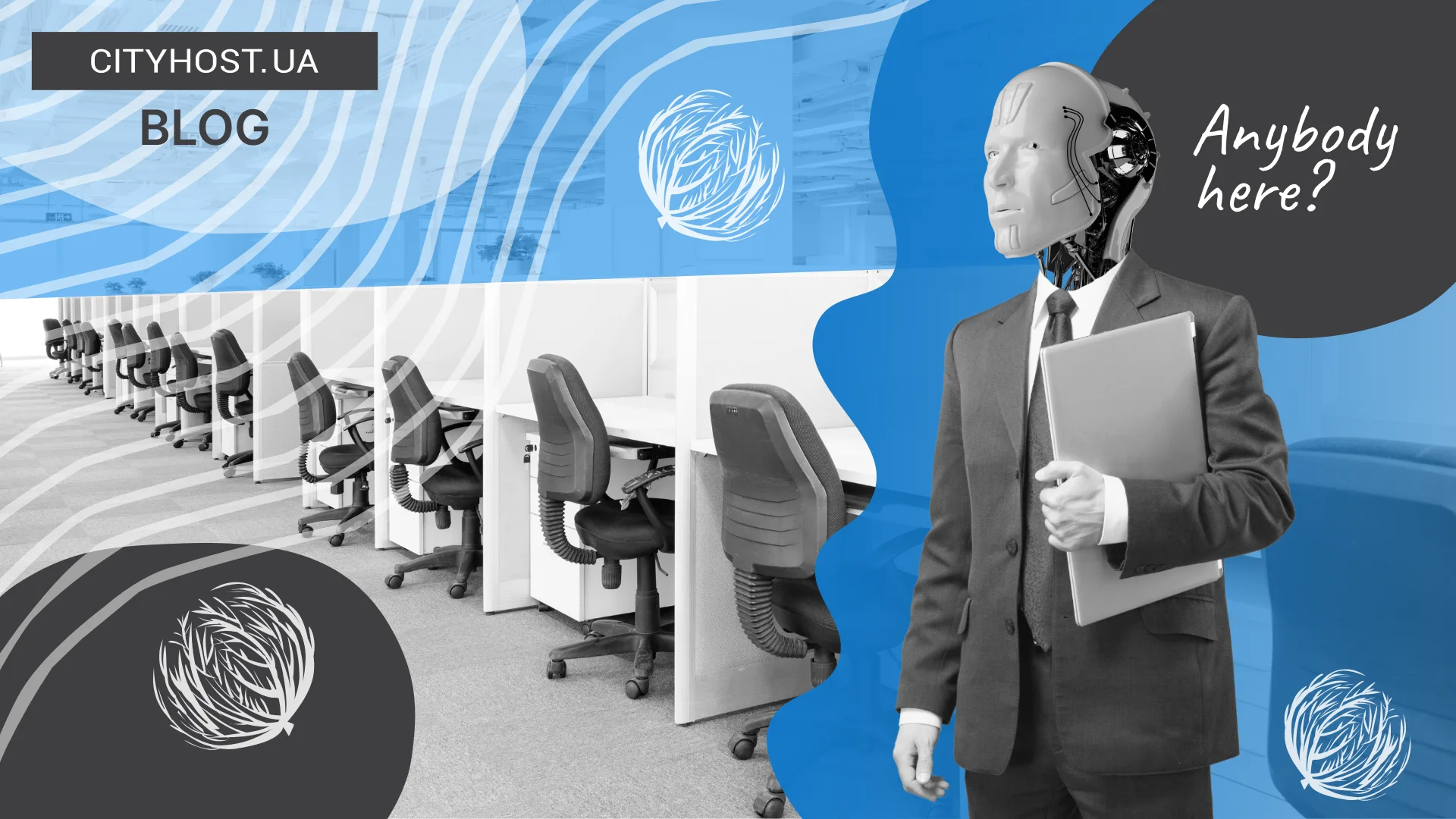
- All-Powerful AI: The Current Capabilities of Artificial Intelligence
- Run Forrest, Run: Which Digital Specialists Could Be Replaced by AI
- Stop Fighting — Start Conquering: How to Adapt to Job Market Changes with AI
The latest news about artificial intelligence is making people increasingly worried about their future: “American companies laid off 65 000 workers in a month due to AI”, “41% of companies worldwide plan to reduce their workforce by 2030 because of AI”, “Duolingo and Dropbox cited AI as the reason for layoffs”. It poses a particular threat to digital specialists, as modern services are already capable of generating texts, images, and videos, publishing posts, and optimizing advertising campaigns.
In a sense, copywriters, content managers, video editors, graphic designers, and others may indeed soon find themselves out of work, but this applies to individuals rather than entire professions. While some panic and try to compete with artificial intelligence, others master modern tools, reduce their workload, and increase their income. That’s why we propose to explore the real threats AI poses to digital specialists and how to adapt to changes in the job market.
All-Powerful AI: The Current Capabilities of Artificial Intelligence
The concerns of digital specialists about losing their jobs due to AI are entirely understandable, as artificial intelligence is developing at an astonishing pace. It can process vast amounts of information and perform complex calculations in seconds, operate without emotions, and learn instantly. For business owners, AI is the ideal employee: available at any time, never gets tired, doesn’t ask for weekends or vacations, and never complains.
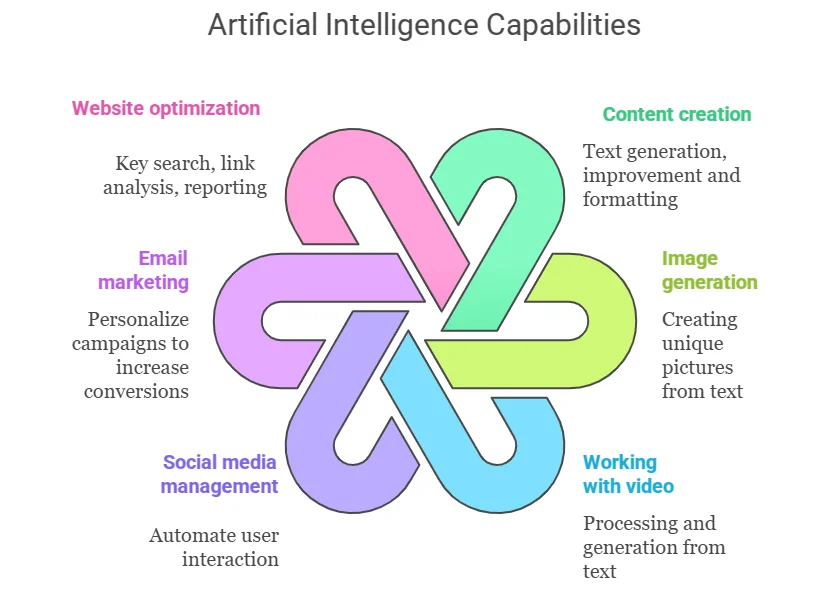
In addition to these advantages, artificial intelligence offers incredible capabilities:
- Content Creation. Services like Grammarly, Wordtune, and ProWritingAid detect errors, recognize tone and complex language, and suggest alternative phrasings to improve text. Jasper, Anyword, ChatGPT, and Gemini can generate content ideas, write, and format texts.
- Image Generation. Midjourney, Stable Diffusion, and Ideogram can create classic illustrations for articles, artistic and historical portraits, and architectural visualizations based on your text prompt.
- Video Editing. Sora, Runway, Wondershare Filmora, and Descript can significantly speed up editing or even generate videos from scratch if you provide clear instructions.
- Social Media Management. Buffer, SocialBee, and Metricool can adapt posts to suit each social network, create content from scratch, determine the optimal posting time, publish content across multiple platforms, and analyze statistical data.
- Email Marketing. Tools like Mailchimp AI, HubSpot, ActiveCampaign, Klaviyo, and Omnisend can craft email subject lines, text blocks, and calls to action, personalize content, optimize sending times, create trigger campaigns, conduct A/B testing, and analyze email effectiveness.
- Website Optimization. Semrush, Ahrefs, Surfer SEO, and Rank Math AI suggest relevant keywords, generate meta tags and descriptions, identify technical issues and provide recommendations, assess backlink quality, predict traffic, and automate reporting.
For every task, there are both specialized tools and all-in-one platforms like ChatGPT, Gemini, and DeepSeek. Most offer free plans with significant limitations, but unlocking their full potential is relatively inexpensive compared to hiring individual digital specialists. For example, ChatGPT Plus costs $20 per month, while the Pro version is $200. Naturally, general-purpose chatbots often deliver inferior results compared to specialized tools. However, even premium access to the latter is available for just a few dozen dollars—for instance, Jasper Creator costs $39 per month, while the Pro version is $59.
Read also: Extraordinary Ukrainian Businesses and Marketing Strategies That Truly Work
Run Forrest, Run: Which Digital Specialists Could Be Replaced by AI
Analyzing the capabilities and advantages of artificial intelligence makes it clear why specialists are so concerned about their future. On the website of marketer Neil Patel, there are even survey results from 1000 digital specialists in the US: 56.7% of freelancers and 56.1% of company employees believe that AI will completely replace marketers in the near future.
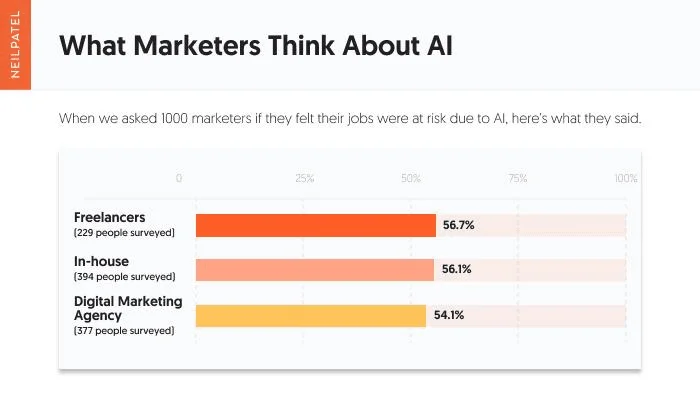
Artificial intelligence poses the greatest threat to the following categories of digital specialists:
- Copywriters. Jasper, Copy.ai, and even the free version of ChatGPT can generate short social media posts, informational articles, product and service descriptions, and video scripts. By creating a request (similar to a brief for copywriters), you can receive an optimized and formatted text within a minute.
- Content Managers. AI is already performing exceptionally well with social media, allowing for audience analysis, content planning, content generation and editing, optimal posting time selection for each platform, and automatic publishing. The situation with websites is more challenging, but many services, such as Jasper and Copy.ai, now offer API solutions for WordPress, Joomla, and other popular CMS platforms.
- Email Marketers. AI platforms can generate content, segment audiences, send emails, and analyze user reactions, taking over all technical aspects. Their main drawback is the inability to fully adapt to a brand's unique style, but even in this area, AI is evolving rapidly, learning company-specific details and incorporating them into new emails.
- Graphic Designers. AI-powered generators can instantly remove or add objects in photos, enhance image quality, create illustrations from scratch, design logos, advertising banners, and covers based on text prompts. For companies with small budgets, these tools are often the only way to quickly and affordably produce visuals for websites, mobile apps, and advertising campaigns.
- PPC Specialists. Advertising platforms like Google Ads and Meta Ads have already integrated AI, enabling them to select the optimal audience for ads, automatically determine campaign budgets and bid amounts for individual ads, generate headlines and ad copy, analyze performance, and optimize strategies. They provide step-by-step settings, allowing even beginners to launch ad campaigns with optimal bids without the need for a PPC specialist.
- SEO Specialists. Tools like Semrush and Ahrefs can already analyze competitors, select and cluster keywords, optimize texts, audit websites, and predict traffic. While technical SEO was once intimidating for many, now even beginners can manage it with AI-powered software — provided they have the budget for a subscription.
Let's say you want to launch an online store from scratch. You only need to purchase a virtual hosting or dedicated server, register a domain name, install a CMS and template, and configure basic settings. From there, artificial intelligence can handle semantic keyword research, content generation, text optimization and formatting, ad campaign management, and social media promotion. Of course, AI platform access requires funding as well, but for large workloads, the budget needed will be significantly lower than hiring individual digital specialists for each task.
Read also: ChatGPT-4 is available on Bing — How to use artificial intelligence for business for free
Not Smart Enough: Key Drawbacks of Artificial Intelligence
Studying the capabilities and advantages of AI raises a simple question: why do companies still hire digital specialists? Businesses continue investing in AI, developing new services, and improving existing ones, yet job boards and freelance platforms list dozens of new openings daily, even for simple tasks.
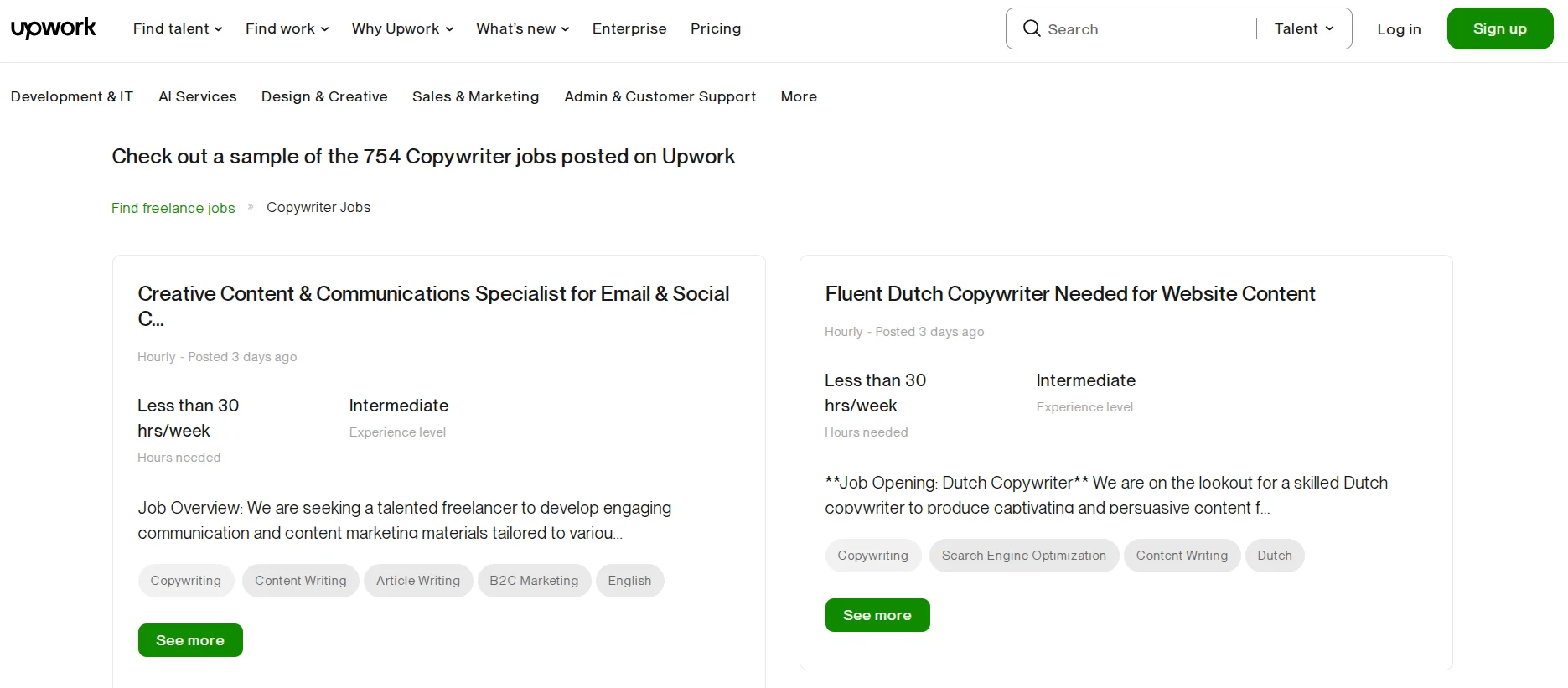
For example, at the time of writing this article the freelance marketplace UpWork has 754 active listings for copywriters and content writers.
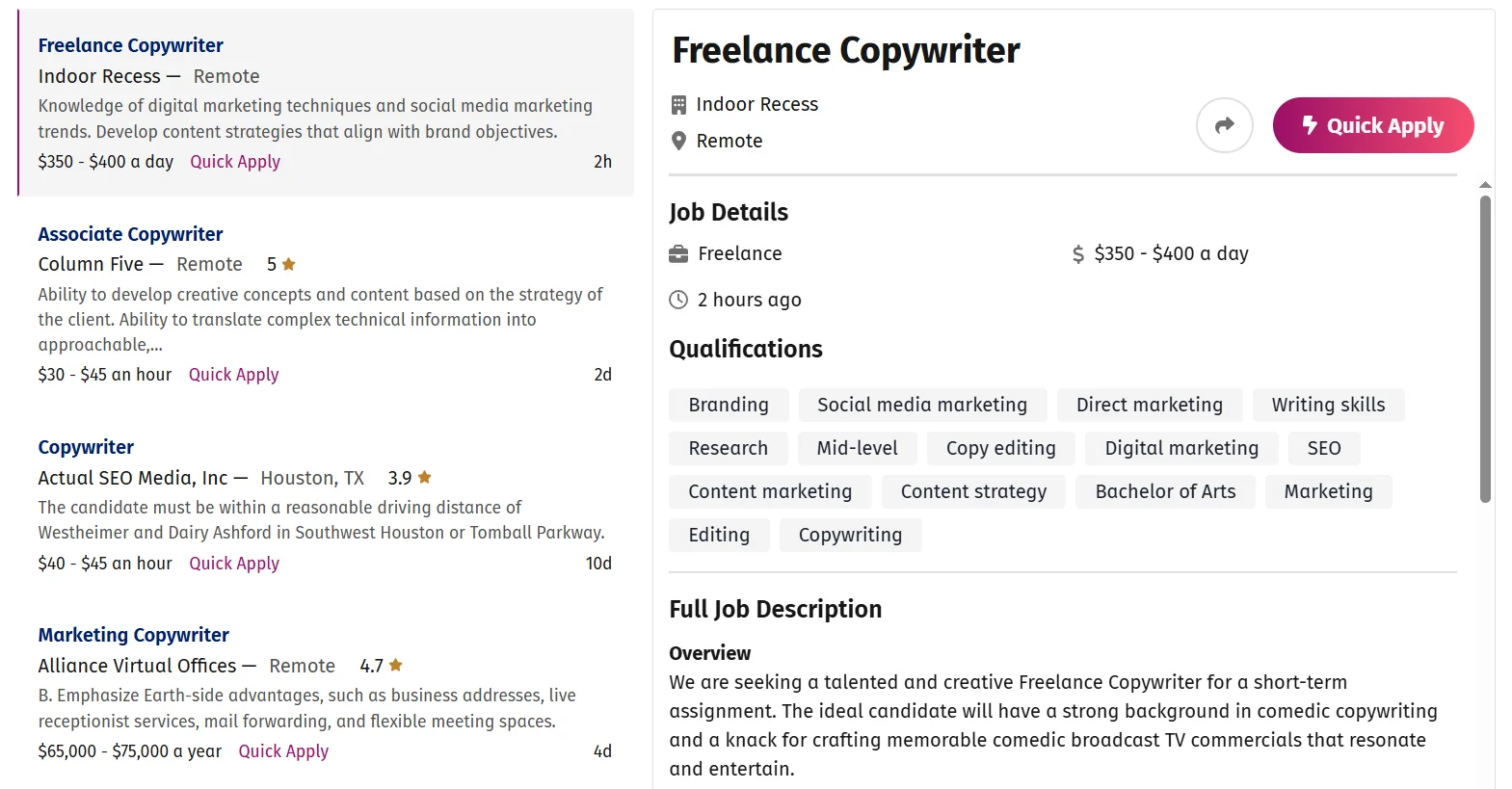
The job site SimplyHired has 713 open positions labeled ‘copywriter’.
One reason AI integration is still limited is that not much time has passed since artificial intelligence became widely available. While AI is evolving at an incredible pace, it’s still too early to talk about fully automating routine tasks, let alone completely replacing digital specialists. However, another major factor is AI’s significant shortcomings, which currently prevent it from performing even simple tasks with high quality.
Lack of Critical Thinking
After the rise in popularity of ChatGPT, headlines began declaring the death of copywriting, as AI platforms can instantly rewrite content, generate informational articles, and even craft advertising texts. However, these tools produce content based on patterns and statistical probabilities rather than true comprehension, meaning they cannot assess the accuracy of information or grasp deeper contexts.

In April 2023, ChatGPT falsely claimed that a law professor had made inappropriate sexual comments and attempted to touch a student, even citing The Washington Post as a source. However, The Washington Post never published such an article, and the alleged incident never occurred.
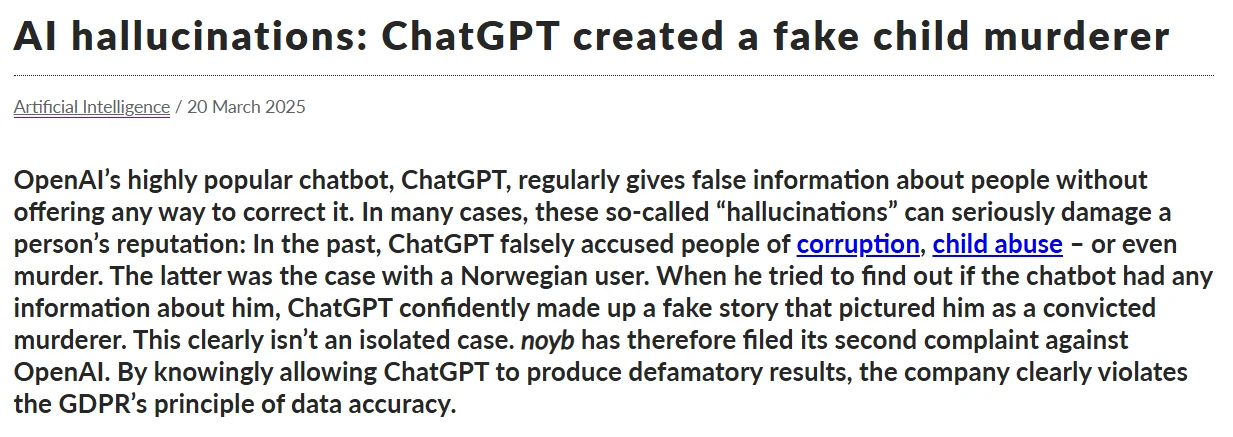
Here’s another recent controversy that further proves AI-generated data cannot be blindly trusted.
The primary goal of AI is to create coherent text, not to uncover the truth. It relies on existing data without any real analysis, and that data often contains false information, systemic errors, and stereotypes. A human copywriter can also make mistakes, but they typically verify sources first, reducing the likelihood of errors — at least, among qualified professionals. Moreover, humans are held accountable for mistakes (warnings, termination, legal consequences), which encourages them to double-check facts, whereas AI faces no repercussions.
Read also: How to Recognize AI-Generated Text — Tips for Editors and Content Creators
Lack of Emotional Intelligence
AI cannot truly understand human emotions or the nuances of communication. It only imitates human reactions but does not actually feel them. This has been repeatedly demonstrated by users of ChatGPT, Gemini, Claude, and other bots, which often display an “emotionally cold” demeanor in conversations, leading to overwhelmingly negative reactions.
The absence of emotional intelligence prevents AI from fully grasping a business's needs, sometimes resulting in serious conflicts. For example, in 2022, an Air Canada chatbot misinterpreted the company’s discount policy, forcing the airline to reimburse additional expenses for Jake Moffatt, a Canadian resident.
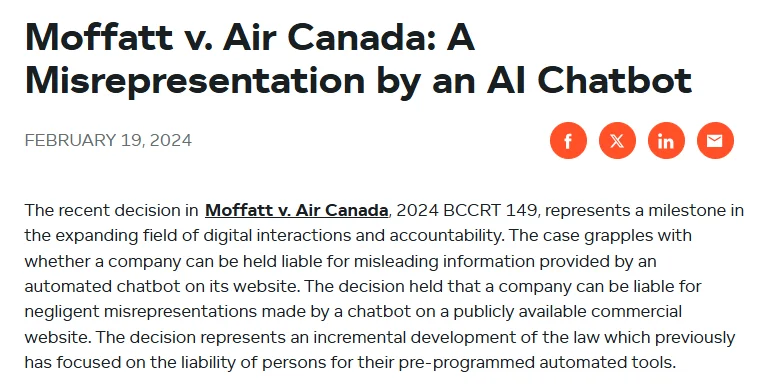
Dependence on Input Data
We’ve touched on this issue earlier, but now let’s explore it in terms of content uniqueness. AI does generate technically unique texts — when checked with plagiarism detection tools, they usually show 100% uniqueness. However, this content doesn’t contain new information, as AI merely rephrases, combines, and restructures existing data. It does not create new knowledge or original ideas — only repackages what already exists.
For example, if AI is used to generate a review of a new smartphone model, it will analyze available specifications, user reviews, and online articles before presenting the same known information in different words. It won’t be able to personally test the device, notice small usability details, or provide subjective impressions.
Or let’s say you need to mention an app in an article or even create a full review of it. We asked ChatGPT about the Self-Esteem app.
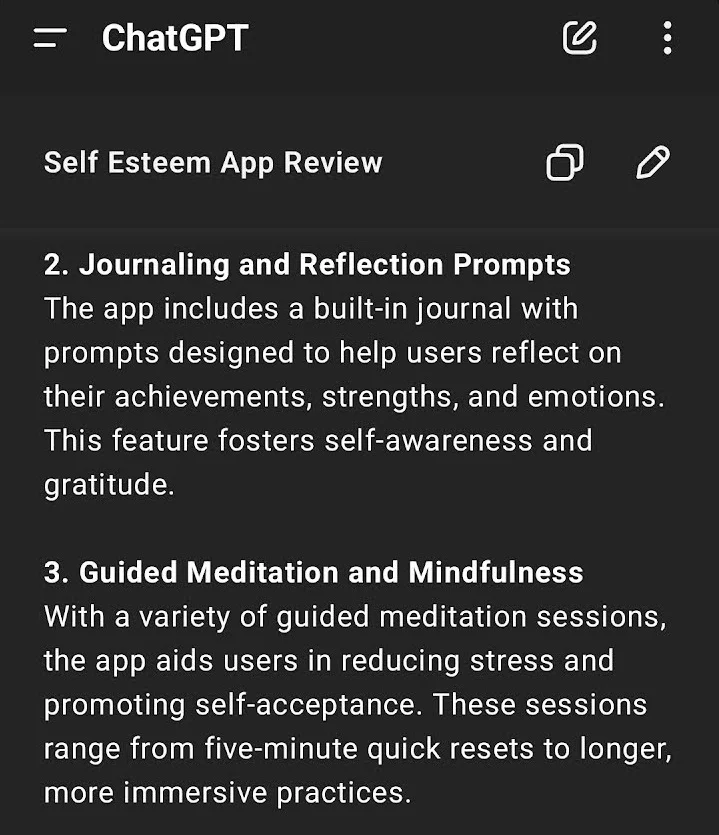
This app is a collection of articles on mindfulness, gratitude, strengths analysis, and self-esteem improvement, featuring affirmations but no meditation features. Despite the app being well-established and having sufficient information available on the Play Store, the AI provided only a general description. And we asked if there were any meditations in this app.

ChatGPT didn't even answer the question — it just changed the first version of the text.
Unlike AI, a human copywriter can personally test an app, notice hidden drawbacks or advantages that are not mentioned in official descriptions, and provide a truly unique perspective. The same applies to reviewing services, software, electronics, and other products. Such a review would not only be technically unique but would also contain genuinely new, exclusive insights that are not yet available online.
Maximum Dependence on Query Quality
After analyzing AI’s previous shortcoming, you might think: “What’s so difficult about writing a detailed task brief? A digital specialist also needs clear instructions”. That’s partially true — copywriters, graphic designers, PPC experts, and others require a well-defined task description.
However, a skilled professional, with experience and context understanding, can interpret the task and even suggest better solutions without requiring constant clarification. Take, for example, the same text about Self-Esteem: you’d need to specify what you want in the script, but you wouldn’t have to explain how the app works, its key features, or its hidden issues. A copywriter would test the app themselves and highlight these aspects.
AI’s output depends entirely on how the request is formulated. To get high-quality content, you must spend time refining your query and making constant adjustments. In simpler terms: AI only uses existing data and won’t “think” to explore additional aspects, whereas a digital specialist will dive deeper into the topic and even propose better methods to achieve the desired result.
Stop Fighting — Start Conquering: How to Adapt to Job Market Changes with AI
"AI won’t replace humans, but people who use AI will replace those who don’t". — Kai-Fu Lee, venture investor and former Google China executive.
The development of AI is unstoppable, so the best approach is to understand its limitations, preserve your unique advantages, and enhance them using AI itself. By following these strategies, you can adapt to the changing job market, secure your position, and improve your work quality.
Identify Unique Skills
The most important step is to recognize your advantages over AI. Common strengths include quickly understanding and improving technical assignments, immediate adaptation to changes, personal experience, the ability to deeply test products and share insights, emotional intelligence, strategic thinking, and making well-founded decisions based on current data.
Each digital specialist has unique tasks where they outperform AI:
- Copywriters — test products, deeply understand audience psychology, consider emotional triggers and subtle nuances of perception, and adapt to a company’s brand voice.
- Graphic designers — create original solutions and have UX/UI-oriented thinking, ensuring a smooth user experience on websites or apps.
- SEO specialists — better analyze user intent, develop and adjust site promotion strategies, implement updates based on search engine algorithm changes, and perform in-depth technical optimizations.
- SMM managers — analyze and create viral content by leveraging memes, trending videos, and marketing campaigns, understand social media context and emotions, and handle crisis management effectively.
- PPC specialists — conduct deeper research on competitor ads, develop strategies, craft unique selling propositions, and manage budgets more flexibly — especially during seasonal demand fluctuations or sudden market shifts.
Digital specialists thrive on deep analysis, strategy, and a personalized approach. Your goal is to identify your strengths and continuously improve them, making yourself “irreplaceable” even as AI continues to evolve rapidly.
Learn to Use Helpful AI Tools
Once you've identified the unique skills and tasks that you can handle better than AI, move on to developing the ability to work with modern assistants. To begin, study the basics of Prompt engineering, i.e., creating and optimizing queries that will be understandable to artificial intelligence. Studying basic information doesn't require too much time, but it saves your nerves and helps you get the desired result better and faster!
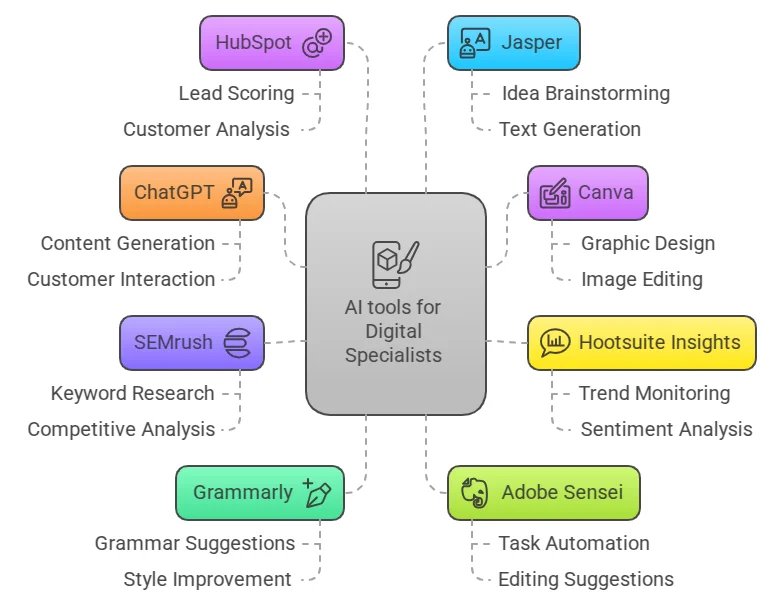
Then, proceed to study the services that may be needed to complete your tasks (we provided a list in the first section of the article). For example, copywriters can use ChatGPT, Gemini, Jasper to find basic information and create a first draft, and after writing the text, Grammarly to check for errors. Designers can use Midjourney to find ideas, and then focus on detailing and adding unique elements. SEO/PPC specialists are recommended to automate data analysis through Ahrefs, SEMrush, Google Ads AI, but develop strategies and make decisions independently.
Deepen Expertise and Learn New Things
Artificial intelligence can help with certain tasks, but the main ones remain with digital specialists who need to constantly improve their existing skills and learn new things. Develop analytical thinking, that is, don't just use AI, but understand how it works and what its limitations are. Learn trends in your field, collect and analyze competitors' projects. Invest time and resources in developing creativity, empathy, critical thinking, strategic planning — skills that AI cannot replace.
We don't know how artificial intelligence will develop and what it will be capable of even in 5-10 years, let alone the distant future. However, now you don't need to try to compete with AI or ignore its existence at all, but rather deepen your knowledge, study and use AI as tools. This way you will be able to automate routine tasks, focusing on strategy and creativity, thereby remaining a sought-after specialist and becoming a leader in an industry that is increasingly dependent on technology.









